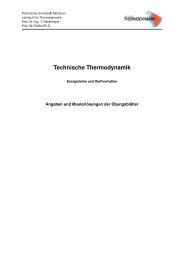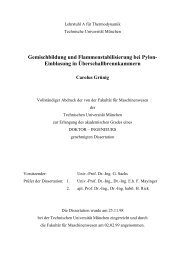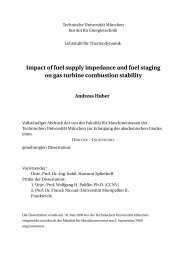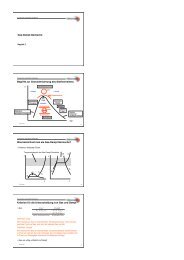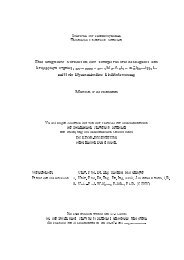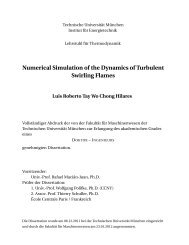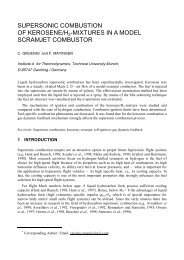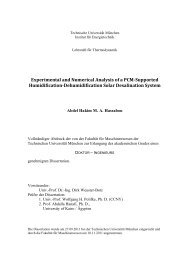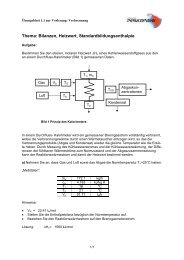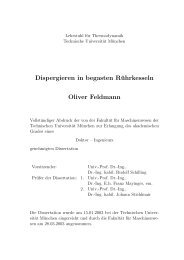On the Formation of Nitrogen Oxides During the Combustion of ...
On the Formation of Nitrogen Oxides During the Combustion of ...
On the Formation of Nitrogen Oxides During the Combustion of ...
Create successful ePaper yourself
Turn your PDF publications into a flip-book with our unique Google optimized e-Paper software.
1 Introduction<br />
1.3 <strong>Oxides</strong> <strong>of</strong> <strong>Nitrogen</strong> <strong>Formation</strong><br />
The ongoing public discussion <strong>of</strong> environmental problems caused by <strong>the</strong><br />
combustion <strong>of</strong> fossil fuels is mainly focused on <strong>the</strong> production <strong>of</strong> carbon dioxide<br />
(CO 2 ). Accordingly, <strong>the</strong>re are a large number <strong>of</strong> research activities in <strong>the</strong><br />
field <strong>of</strong> CO 2 reduction and separation. This includes work on an increase in<br />
<strong>the</strong> efficiency <strong>of</strong> combustion related processes, as <strong>the</strong> amount <strong>of</strong> CO 2 is linearly<br />
dependent on <strong>the</strong> amount <strong>of</strong> fuel burned. However, a gain in <strong>the</strong> efficiency<br />
<strong>of</strong> heat engine processes is <strong>of</strong>ten also linked to an increase in combustion<br />
temperature. This is due to <strong>the</strong> fact that <strong>the</strong> achievable efficiency <strong>of</strong> a<br />
<strong>the</strong>rmodynamic process rises with an increase <strong>of</strong> <strong>the</strong> temperature differences<br />
in <strong>the</strong> process. Moreover, a higher temperature level may bring with it <strong>the</strong><br />
added advantage <strong>of</strong> a lower level <strong>of</strong> carbon monoxide (CO) production, due<br />
to higher fuel burnout. The downside <strong>of</strong> this increase in combustion temperature<br />
is a higher production rate <strong>of</strong> <strong>the</strong>rmal NO, described by a mechanism<br />
postulated by Zeldovich in 1946 [471, 472]. Thermal NO is generated in combustion<br />
processes at temperatures above 1800 K, and its generated amount increases<br />
exponentially with even higher temperatures. This amount is a function<br />
primarily <strong>of</strong> temperature and <strong>of</strong> <strong>the</strong> residence time at <strong>the</strong> said temperature.<br />
Hence, not only <strong>the</strong> flame zone but its associated post-flame zone is<br />
usually <strong>of</strong> major importance.<br />
Nitric oxide (NO) must not be confused with nitrogen dioxide (NO 2 ) or nitrous<br />
oxide (N 2 O). In principle, NO and NO 2 are collectively referred to as “nitrogen<br />
oxides” (NO x ) [51, 443, 458]. While <strong>the</strong> NO portion used to contribute up to<br />
90% <strong>of</strong> <strong>the</strong> NO x emission in <strong>the</strong> flue gas <strong>of</strong> most combustion devices burning<br />
fossil fuels, it decreased over <strong>the</strong> last decades, mostly due to combustion modification<br />
techniques or post-combustion methods, both aiming at a general<br />
NO x reduction [51, 69, 201, 380]. Still, NO is considered to be rapidly oxidized<br />
in air, forming NO 2 . Nitrous oxide is accounted for separately in <strong>the</strong> majority<br />
<strong>of</strong> combustion literature.<br />
<strong>Oxides</strong> <strong>of</strong> nitrogen are, in part, responsible for acidic precipitation, cause photochemical<br />
smog in cities, act as a greenhouse gas, participate in <strong>the</strong> ozone<br />
(O 3 ) chemistry by building harmful ozone in <strong>the</strong> troposphere and destroying<br />
beneficial ozone in <strong>the</strong> stratosphere, and are directly noxious to humans as<br />
<strong>the</strong>y affect <strong>the</strong> respiratory system [51, 103, 391, 451]. Public debates about<br />
4



